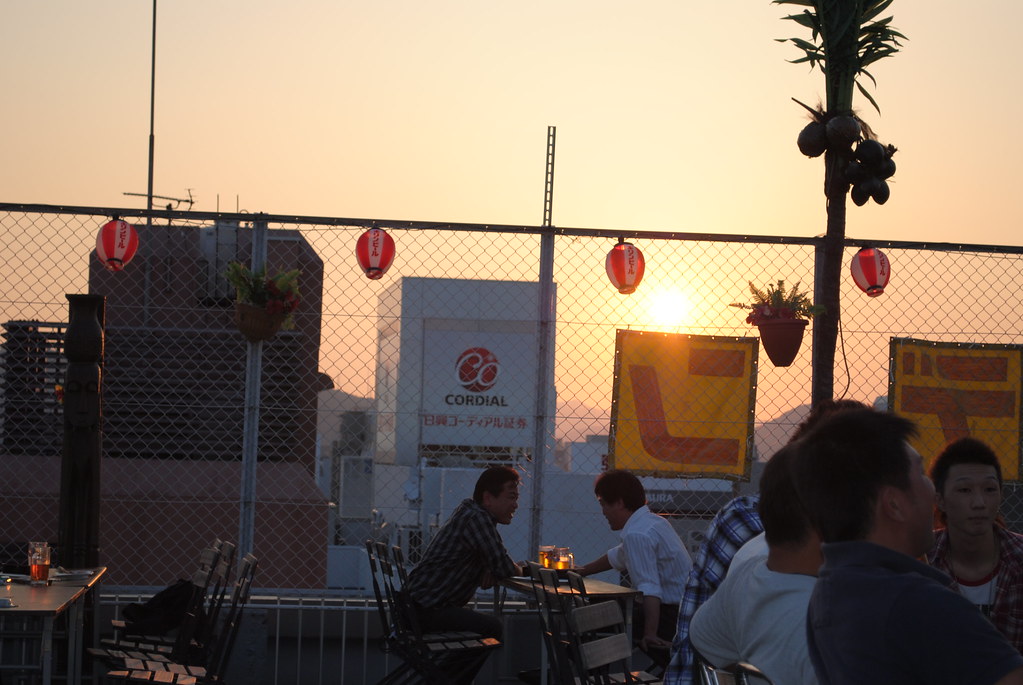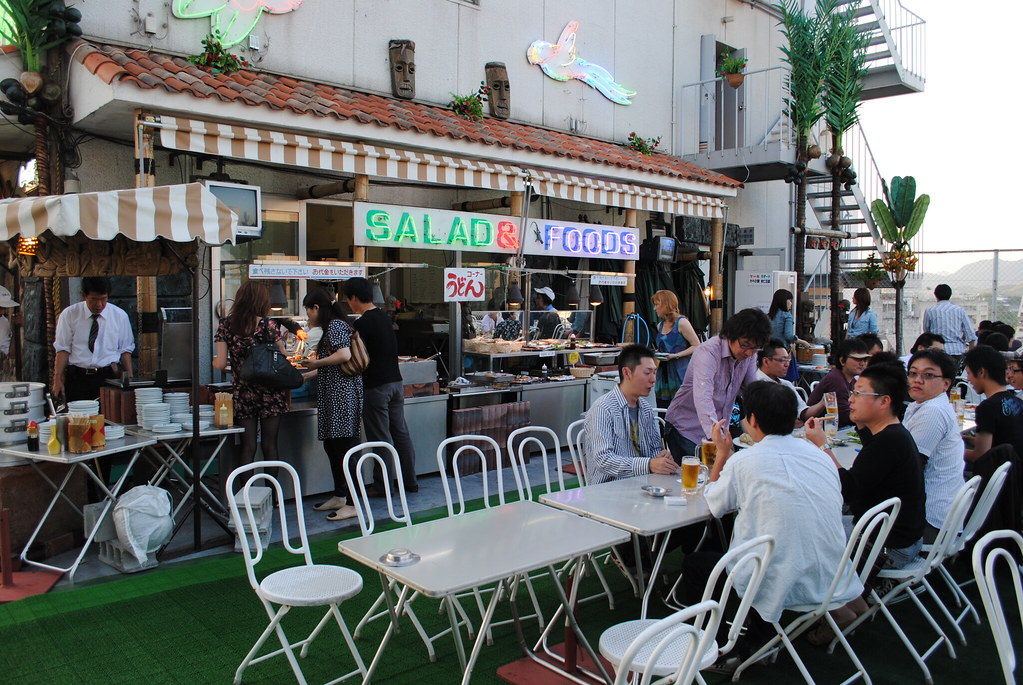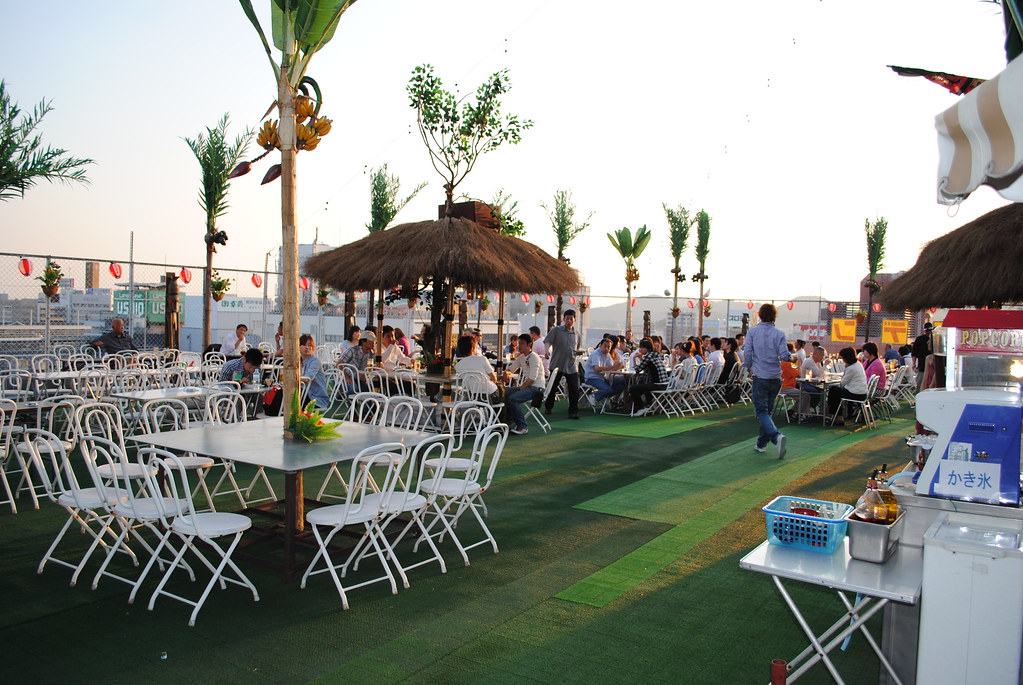Reaching into Japan's bag of surprises today produces a little piece of paper that says "放題". It's added to a verb (or occasionally a noun), making the meaning "all you can X" or "X as much as you like". I'm sure most people would think of Japan as a conservative culture; most of what you see is small, delicate servings of food and minimalistic traditions. More and more though, a buffet culture of "放題" seems to be catching on and becoming another facet of the Dr Jekyll and Mr Hyde nature of Japan. The next time you see a picture of a pretty girl in a 着物 (きもの - kimono) eating 寿司 (すし - sushi), bear in mind that it might be her 26th plate.
From a language perspective, 放題 is as straightforward as the idea itself. Take the ます (masu) form of the verb and replace "ます" with "放題". The most common examples are:
食べ放題 - たべほうだい - tabehoudai - all you can eat, and
飲み放題 - のみほうだい - nomihoudai - all you can drink, which can refer to soft drinks or alcohol (as long as you're over 20 here!).
The main one, of course is 食べ放題 - buffet dining. It's also amusingly known as バイキング - (Viking) - which brings to mind the image of scores of bearded men fighting over pork chops and tankards of beer. Go into your typical ビールガーデン (Beer garden) and you'll probably see why! During summer, ビールガーデン are very popular - they usually sit on the rooftops of breezy highrise buildings; the warmth of the summer nights makes it very comfortable long after the sun sets and the view doesn't hurt either.
The food is usually unsophisticated - 唐揚げ (からあげ - karaage - fried chicken), ピザ (pizza), 春巻き (はるまき - harumaki - spring rolls) and so on. If people wanted to eat healthily, they probably wouldn't go to 食べ放題 places!
I think they're being very generous using the word "salad", but the うどん (udon) was the real thing.
Most ビールガーデン have a tropical theme to them, with lots of fake palm trees and Hawaiian shirts. Of course, if you're interested in stuffing your face somewhere a little more sophisticated, there are hundreds of different kinds of 食べ放題 you can enjoy. In fact, entire guidebooks are published pointing out the best places to get 食べ放題 in each city. These range from extremely posh dining establishments to international cuisine to no-nonsense Japanese cornerstones like 焼肉 (やきにく - yakiniku - BBQ meat), しゃぶしゃぶ (shabushabu - tabletop hot pot) and 寿司. I've even been to an all you can eat dessert place - losing weight is absolutely optional in Japan!
Of course, the 放題 doesn't end after dinner. You can add it to almost anything to make new words, which seem to spring up all the time. Some of the more unusual forms I've heard are:
歌い放題 - うたいほうだい - utaihoudai - all you can sing. カラオケ (karaoke) where you can pay a flat fee to sing all night. A lot of these are 飲み放題 as well, to make sure all the screeching doesn't dry your throat out too much.
乗り放題 - のりほうだい - norihoudai - all you can ride. Particularly during the holiday periods, posters carpet the train station walls advertising regional set-price tickets that you can buy for unlimited train/bus travel for a certain amount of time. They can definitely save a lot of money if you have a lot of trips to make.
やり放題 - やりほうだい - yarihoudai - all you can do/play, which usually refers to ビリヤード (billiards), ボーリング (bowling) and the like, for when the standard hour or two just isn't enough. This usually saves you money, if you have the staying power!
パケ放題 - ぱけほうだい - pakehoudai - short for "パケット" (paketto - packet). Means "all the (data) packets you want" - unlimited internet on your 携帯電話 (けいたいでんわ - keitaidenwa - mobile phone), for example.
詰め放題 - つめほうだい - tsumehoudai - all you can pack/fill. Some markets apparently have this - pay a set price and you can have as many fruits or vegetables as you can fit in one of the bags.
Finally, an interesting one is 言いたい放題 - いいたいほうだい - iitaihoudai - "all you want to say". This one is negative - it can be used to refer to someone who shoots their mouth off without thinking about other people's feelings or the consequences (a big no-no in Japan!).
While Japan might not seem outwardly excessive, the concept of 放題 is becoming more and more popular, particularly with young people. Clearly, too much is never enough, no matter where in the world you are! Watch out for that 着物 girl too - she'll outeat you any day of the week.



No comments:
Post a Comment
If you have any questions or additions, I would love to hear from you. I may not know the answer, but I'll do my best to find out in any case! You can post anonymously if you like, but abusive/unintelligible/inappropriate comments will not be published.